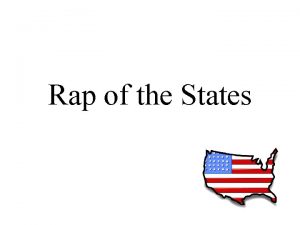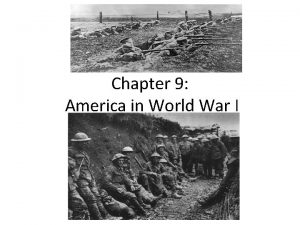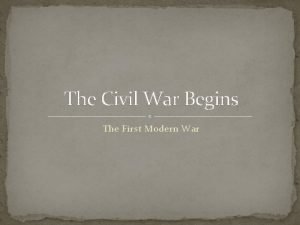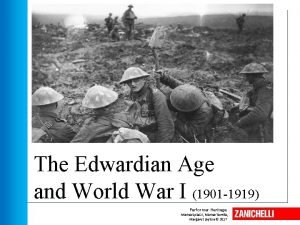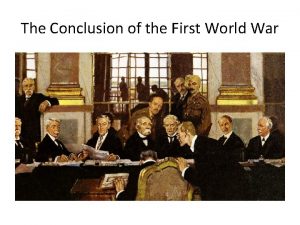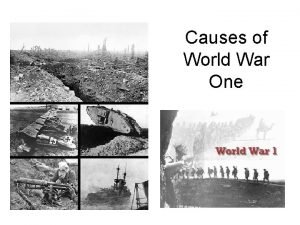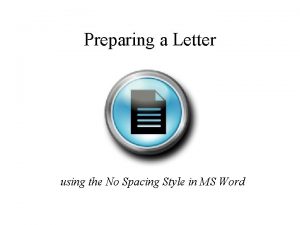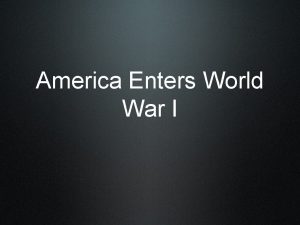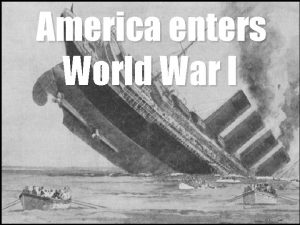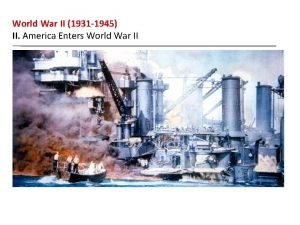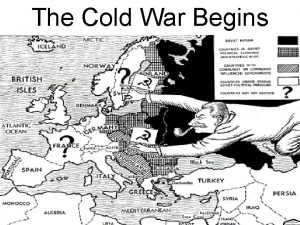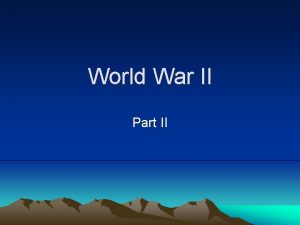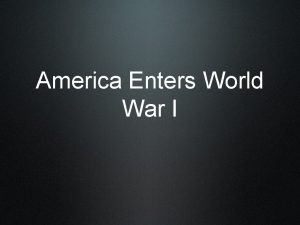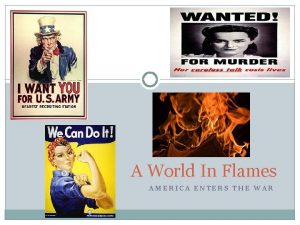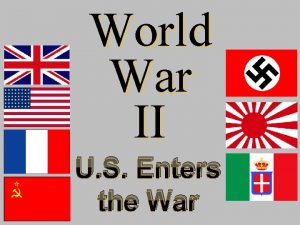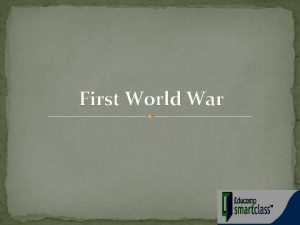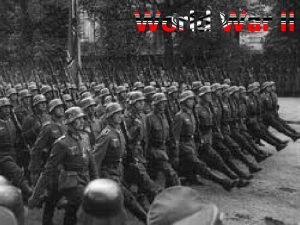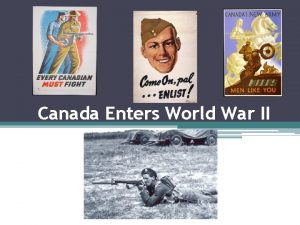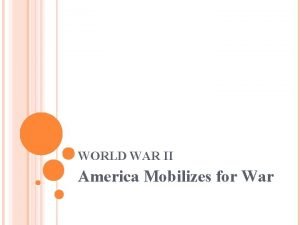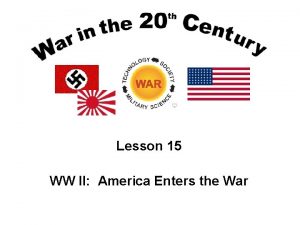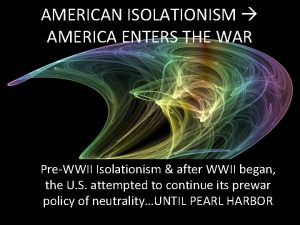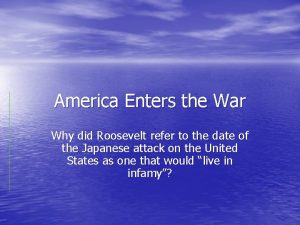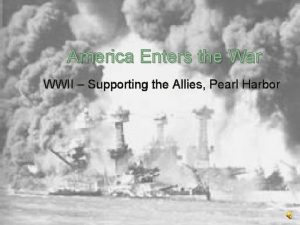America Enters World War I 1 The First























- Slides: 23

America Enters World War I 1

The First World War: What? • War involving nearly all the nations of the world § When? • 1914 -1918 2

The First World War: § Why? Long term 1. Alliance system 2. Imperialist Competition 3. Stockpiling of Weapons Franz Ferdinand, Archduke of Austria and his Wife Sophie, Duchess of Hohenberg one hour before their deaths, June 28, 1914 Short term Assassination of Franz Ferdinand of the Austro-Hungarian 3 Empire

The First World War: § Who? Central Powers: Allies: Germany Austria-Hungary Ottoman Empire Bulgaria Russia France Great Britain Italy Japan United States (1917) Prior to 1917, what nations were involved in World War I? 4

The First World War: § Where? 5

America’s Policy in the Beginning of WWI § America was isolationist § § “Why should I get involved in someone else’s problems” 6

Should the United States enter World War I? U. S. President Wilson 7

U. S. was under attack § The present German submarine warfare against commerce is a warfare against all mankind. . Our motive will not be revenge or the victorious assertion of the physical might of the nation, but only the vindication of right, of human right, of which we are only a single champion. . Armed neutrality, it now appears, is impracticable. -U. S. President Woodrow Wilson's War Message (April 1917) § It would be the resumption of unrestricted submarine warfare that would ultimately bring the United States into the war. -The Gilder Lehrman Institute of American History 8

Democracy § Our object. . . is to vindicate the principles of peace and justice in the life of the world as against selfish and autocratic power. . We are glad. . . to fight. . . for the ultimate peace of the world and for the liberation of its peoples, the German peoples included: for the right of nations great and small and the privilege of men everywhere to choose their way of life and of obedience. The world must be made safe for democracy. . -President Woodrow Wilson's War Message (April 1917) 9

Economics § Beginning in 1916, the Morgan negotiated a series of extremely large loans to France and to England, becoming their exclusive purchasing agent and financier in the United States. -Notable American Volunteers of the Great War, Great War Primary Documents Archive § By 1917, American loans to the Allies had soared to $2. 25 billion; loans to Germany stood at a paltry $27 million. -The Gilder Lehrman Institute of American History 10

Propaganda § A large number of the great newspapers and news agencies of the country have been controlled and enlisted in the greatest propaganda that the world has ever known to manufacture sentiment in favor of war. -Senator George W. Norris in Opposition to President Woodrow Wilson's War Message (April 4, 1917) 11

Propaganda 12

13

Militarism § That which has driven the masses of Europe into the trenches and to the battlefields is not their inner longing for war; it must be traced to the cutthroat competition for military equipment, for more efficient armies, for larger warships, for more powerful cannon. You cannot build up a standing army and then throw it back into a box like tin soldiers. -Emma Goldman, from "Preparedness: The Road to Universal Slaughter" 14

Events that lead to American’s entrance into WWI 1. Blockades • Britain blockaded (stopped) all German ships going to America • Germany announced a submarine war around Britain Y-53 German Submarine 1916 15

• In May, 1915 Germany told Americans to stay off of British ships • They could/would sink them 16

Lusitania • British Passenger Ship with 1200 passengers and crew (including 128 Americans) • Lusitania torpedoed by a German U-Boat, sinking all passengers and crew • Was eventually found to be carrying 4200 cases of ammunition German Propaganda Justifying Lusitania sinking 17

Lusitania • The US sharply criticized Germany for their action • Germany agreed not to sink passenger ships without warning in the future Note in Bottle After Lusitania Disaster 18

Submarine Warfare • 1917 Germany announced “unlimited submarine warfare” in the war zone 19

Zimmerman Telegram • Britain intercepted a telegram from Germany to Mexico • Mexico was asked to enter the war and become allies with Germany, and in return was promised Texas, New Mexico, and Arizona 20

U. S. Enters World War I On April 6, the US declared war on Germany. Check out this video: http: //videos. howstuffworks. com/di scovery/30141 -assignment-discovery -america-enters-world-war-ivideo. htm 21

How was the war looking for the allies? Not Good. . . • Russia left the war after its communist revolution in 1917 • Made it a one front war for Germany - all its troops could concentrate on France 22

What did the US do to help? Supplies: § US provided the food, money, and fresh troops needed to win the war American Troops March Through London 23
 We can do a rap of the map of the us
We can do a rap of the map of the us Chapter 9 america in world war 1
Chapter 9 america in world war 1 Why was the civil war considered the first modern war
Why was the civil war considered the first modern war The edwardian age zanichelli
The edwardian age zanichelli Wwi conclusion
Wwi conclusion Caused of ww1
Caused of ww1 Europe asia north america south america
Europe asia north america south america Whats an onomatopeia
Whats an onomatopeia Why is called latin america
Why is called latin america Performance e body art
Performance e body art Business letter spacing format
Business letter spacing format Canada enters ww2
Canada enters ww2 Nombres naturals i enters
Nombres naturals i enters When white light enters a prism
When white light enters a prism A 55 kg skateboarder enters a ramp
A 55 kg skateboarder enters a ramp Nombres enters primaria
Nombres enters primaria Chapter 6 humans in the biosphere
Chapter 6 humans in the biosphere Wipro talent transformation
Wipro talent transformation Who is the watchman in john 10:3
Who is the watchman in john 10:3 Describe the bedroom which montag enters
Describe the bedroom which montag enters Jesus enters jerusalem matthew
Jesus enters jerusalem matthew The _____ controls what enters and leaves the cell.
The _____ controls what enters and leaves the cell. Jesus enters the temple
Jesus enters the temple This organelle controls what enters and exits the cell. *
This organelle controls what enters and exits the cell. *
